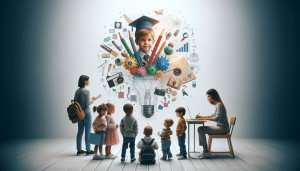Why Lifelong Learning Changes Your Future
Oliver Cooper September 26, 2025
Explore how lifelong learning can reshape your path and enhance career options, personal growth, and adaptability in a changing world. Discover practical insights, strategies, and real-life programs that open doors in education and society for all ages.
Understanding the Lifelong Learning Mindset
Lifelong learning goes beyond school or formal degrees. It’s the ongoing, voluntary, and self-motivated quest for knowledge. The advantages are vast: it keeps the mind sharp, builds confidence, and unlocks new career pathways. Many adults turn to flexible, online education resources to build new skills, stay relevant in fast-evolving industries, and satisfy their curiosity. This adaptive learning approach is particularly significant in today’s digital landscape, where change is constant and adapting quickly is important. Rather than remaining static, lifelong learners embrace opportunities to grow throughout life, regardless of age or career stage. This shift in mindset has widespread effects on both individual development and the broader fabric of society.
Employers now seek candidates who demonstrate adaptability and continuous learning. Those who upskill through professional development courses, language studies, or technology training are often able to take on higher-paying, more satisfying roles. Upskilling isn’t limited to tech—it includes leadership, communication, and creative thinking too. The concept of reskilling is increasingly in demand as industries evolve and some jobs disappear while others arise. Programs like free online courses and employer-sponsored classes help bridge knowledge gaps and support upward mobility without high costs. As more organizations support lifelong learning, it becomes a core strategy for economic resilience and personal fulfillment alike.
Societal benefits of lifelong learning extend far beyond individual achievement. When communities value education at every stage, they tend to exhibit higher civic engagement, lower unemployment, and greater adaptability in the face of economic or technological disruption. Public libraries, community centers, and universities now offer access to a variety of skill-building opportunities for adults and seniors. This democratization of education—removing barriers to access—helps more people participate in economic, social, and cultural life. As individuals become more informed and skilled, they contribute more meaningfully to society, shaping a brighter collective future.
Strategies That Help You Keep Learning
The process of lifelong learning can be tailored to fit any lifestyle. For some, it might mean enrolling in a free online university course, while others may join local workshops, library seminars, or professional events. Setting clear, achievable goals makes consistent progress more likely. Breaking complex subjects into smaller, manageable learning units can help prevent overwhelm and build confidence. Time management is crucial; dedicating even 20 minutes a day to a new subject helps reinforce habits and ensures meaningful progress.
Technology plays a significant role in supporting modern learners. Platforms such as OpenLearn or Coursera offer structured modules in areas like digital literacy, finance, or creative arts, ensuring broad accessibility and flexibility. Many people blend traditional and digital learning—reading books, listening to podcasts, and practicing through interactive apps. Peer groups and online communities foster motivation by connecting learners with shared interests, while also creating support networks to encourage continuous improvement. Feedback, from mentors, peers, or self-assessment, ensures that learning is deep and retained over time.
Reflection is another powerful technique that keeps learning effective. Keeping a learning journal can be especially useful for identifying growth, tracking skills acquired, and understanding areas for further exploration. The act of teaching others—discussing new knowledge with friends or family—reinforces understanding and aids memory retention. Experimenting with new learning formats and being open to challenges also strengthens problem-solving skills, which are valuable in personal and professional contexts. Lifelong learners often become more curious, resilient, and equipped to handle change.
Accessible Education Programs for Every Age
Accessible education programs now cater to all demographics, from school-age children to retirees. Many universities offer community outreach or extension programs, granting everyone the opportunity to pursue new interests. Libraries serve as essential local venues—providing free courses in digital skills, financial literacy, or creative writing. These options are designed to break down barriers to education, such as cost, location, and prior academic achievement, making them welcoming for all backgrounds and learning abilities.
For working adults, professional development resources are expanding. Employers increasingly encourage staff to take online trainings on emerging technologies, regulatory changes, or soft skills. Microcredentialing and certificate programs give learners the ability to upskill without the long-term commitment or cost of a full degree. Many well-known universities and online platforms provide recognized certificates upon completion, boosting resumes and demonstrating commitment to personal growth. This flexible approach fits into busy lives, making education continuous and highly personalized.
Seniors also benefit from targeted lifelong learning programs. Research shows ongoing cognitive engagement supports memory and general well-being in older adults. Senior centers, adult education nonprofits, and intergenerational courses are just a few examples of inclusive opportunities that support connection and social contribution. By ensuring accessibility and inclusivity across all ages, communities foster a culture where learning is celebrated and age is never a barrier to new knowledge or skills.
The Role of Digital Literacy in Modern Education
Digital literacy has emerged as one of the most critical components of lifelong learning in the modern world. The ability to locate, evaluate, and create information using digital technologies is increasingly considered essential for both personal and economic participation. Whether pursuing online courses or using productivity tools at work, digital skills help bridge the gap between opportunity and achievement. As remote work, telemedicine, and digital commerce expand, those without digital proficiency face new challenges in daily life.
Schools, nonprofits, and employers recognize these needs and are integrating digital skills training into their offered programs. Initiatives like the Digital Literacy Framework provide guidelines for learners to safely and effectively navigate online environments. Digital citizenship—understanding online rights, privacy, and responsibilities—is also central in these trainings. Supporting individuals in building not only technical proficiency but also the ability to critically assess online sources and participate respectfully fosters a more informed and safer community.
Youth and adults alike need opportunities to keep digital skills updated as technology evolves. Public institutions, from libraries to community tech labs, deliver programs on cybersecurity, coding, and productivity software. These can be especially helpful for those transitioning careers or re-entering the workforce. Building digital literacy is not just about technology; it’s a gateway to lifelong learning, empowering individuals to adapt to the future, access diverse information, and engage confidently in society.
Social Benefits of Embracing Lifelong Learning
Lifelong learning builds more than knowledge—it builds stronger communities. When people invest in their own learning journeys, they often inspire and support those around them. Parents who value education often model behaviors that promote curiosity in their children, while adults engaged in skill-building may contribute more to community organizations, volunteer projects, and mentoring efforts. This creates a positive feedback loop that bolsters social cohesion and shared purpose.
Societies that invest in accessible and inclusive lifelong learning see far-reaching returns. There is growing evidence linking adult education programs to reduced rates of crime, increased civic engagement, and larger participation in democratic processes. Exposure to new ideas and perspectives through diverse learning environments helps combat prejudice and promotes tolerance. Public institutions and policymakers interested in fostering resilient, adaptable communities frequently prioritize education reform and investment in learning infrastructure.
Empowering individuals through lifelong learning also supports workforce development and innovation. As industries develop and shift, adaptability becomes a cornerstone of economic growth. Lifelong learners are less likely to be sidelined by change—they are more equipped to switch roles, embrace entrepreneurial ventures, or contribute to rapidly evolving sectors. Ultimately, the ripple effects extend to healthier, safer, and more prosperous societies. Learning truly never ends—and its social benefits only expand with time.
Overcoming Barriers and Creating Lasting Motivation
Even when the benefits are clear, challenges can stand in the way of lifelong learning. Common hurdles include cost, time, access to resources, and a lack of support. Many institutions are working to break down these barriers by offering scholarships, flexible schedules, and digital learning hubs. Community partnerships and nonprofit organizations often fill gaps—delivering tailored resources to vulnerable populations, such as recent immigrants, unemployed adults, or people with disabilities.
Staying motivated is key. Setting realistic expectations and celebrating small wins help keep momentum alive. Joining discussion groups or study partnerships provides support and accountability. Institutional recognition of achievements—badges, certificates, public celebration—helps reinforce commitment. Chronicling progress and reflecting on personal growth, through journals or mentoring, can sustain learning interest even when enthusiasm waivers.
The future of lifelong learning is bright. Global trends show continued expansion of online resources, collaborative platforms, and funding for all-age education. Those who embrace curiosity, remain open to change, and seek out new knowledge not only future-proof themselves, they also nurture a more robust and connected society. Overcoming barriers is possible—often with a blend of institutional support and personal determination. In the end, the drive to learn is one of humanity’s most powerful assets.
References
1. National Center for Education Statistics. (n.d.). Adult Learning. Retrieved from https://nces.ed.gov/programs/coe/indicator_tcg.asp
2. UNESCO Institute for Lifelong Learning. (n.d.). Why is lifelong learning important? Retrieved from https://uil.unesco.org/lifelong-learning/why-is-lifelong-learning-important
3. Pew Research Center. (n.d.). Lifelong Learning and Technology. Retrieved from https://www.pewresearch.org/internet/2016/03/22/lifelong-learning-and-technology/
4. OpenLearn. (n.d.). Free Courses. Retrieved from https://www.open.edu/openlearn/free-courses
5. World Economic Forum. (n.d.). Lifelong learning: what is it and why do we need it? Retrieved from https://www.weforum.org/agenda/2022/05/lifelong-learning-education-skills/
6. U.S. Department of Education. (n.d.). Office of Career, Technical, and Adult Education. Retrieved from https://www2.ed.gov/about/offices/list/ovae/pi/AdultEd/adultbasiced.html







